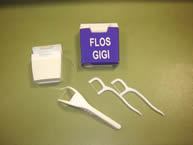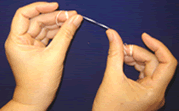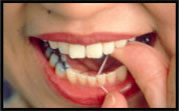What is dental floss?
Dental floss is a special type of thread used to clean the teeth. It is very strong and can be used for cleaning spaces between teeth which cannot be reached by toothbrushes.
Why is flossing important?
The spaces between our teeth are very narrow and difficult to clean. Flossing complements tooth brushing. It removes food debris and dental plaque between the teeth which are not readily accessible to tooth brushing.
Types of dental floss.
There are a few types of dental floss:
- Waxed or unwaxed floss
- Flavoured or unflavoured floss
- Dental tapes
- Super floss
All of the above are equally effective with a proper technique of flossing

How often do you need to floss?
Floss regularly, Floss at least once a day, especially just before bed time.
How should you floss?
Follow these steps :
- Wrap an 18-inch strand around your middle fingers and hold a one-inch section tightly.
- Guide the floss gently between your teeth. Move up and down several times while curving around the teeth at the gum line.
- Always floss behind the last tooth.
- Unwind clean floss as you proceed.


How do I use floss to children or individuals with disabilities?
Usually floss can be used by everyone. For children or the disabled, the parents/guardians should help and teach until they can do it effectively. Dental floss with special holder may facilitate the disabled during flossing.
Why sometimes my gums bleed when flossing?
Gums may bleed during flossing. Reasons for these: Firstly, incorrect flossing technique may hurt your gums, consequently minor bleeding may occur. Secondly, it is an early sign that your gums not in a good condition. The unhealthy gums normally bleed easily during flossing or brushing.
Can the use of dental floss cure gingivitis (inflammation of the gums)?
Good oral hygiene practices such as brushing regularly, flossing teeth and gaggling with mouthwash may cure gingivitis. It would be more effective if used in combination and with the proper brushing and flossing technique. If the disease is not cured, you must get treatment from your dentist.
What should be noted when flossing?
- You must use correct flossing movements. Incorrect technique may cause injury to the gums.
- You may experience soreness or gums bleeding during the first few days of flossing. If the bleeding continues after a week of flossing, consult your dentist.
- If you are having difficulty learning the right flossing techniques, do not hesitate to consult and get guidance from your dentist.
| Last Reviewed | : | 23 August 2019 |
| Writer | : | Dr. Che Noor Aini bt. Che Omar |
| Dr. Sharol Lail Sujak | ||
| Reviewer | : | Dr. Sharol Lail bin Sujak |







